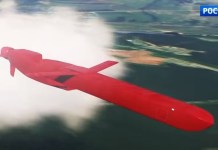On February 5, India seized the Chinese vessel Da Cui Yun, a Hong Kong-registered cargo ship with COSCO Shipping Corporation Limited, bound for Port Qasim in Karachi, Pakistan at Deendayal Port, Kandla, Gujarat.
Five Chinese Supplied Weapons To Pakistan That Pose A Big Threat To India
As EurAsian Times reported earlier, India claimed that an intelligence tip-off about the ship was received by the Customs officials and based on intelligence, it was interrupted on February 3 when it stopped at Gujarat’s Kandla Port during its forward journey from Jiangyin Port in China.
India claimed that the detained vessel was transporting cargo that could be used to make nuclear missiles. After the ship docked, Indian port authorities conducted a search and found an industrial dryer, which Indian authorities said can be used to manufacture long-range missiles.
As per reports, the autoclave which is 18×4 metre in dimension is a pressure chamber that can be used for both civilian and military purposes. Officials from the Defence Research and Development Organisation (DRDO) later conducting a through examination.
China Denies Indian Allegration That Pakistan Bound Ship Breached Export Control Restrictions
The information available on the marinetraffic (a website that taps the movement of all listed vessels), has revealed that Da Cui Yun had left China for Port Mohammed Bin Qasim on January 17, 2020. Remarkably, the port where it was on its way is close to the Space and Upper Atmosphere Research Commission (SUPARCO), which established Pakistan’s nuclear programme.
The development has worried the Indian security officials because of the connections shared between Pakistan and China. Back in 1989, Islamabad had entered into a contract with Beijing to buy 34 solid-fuel M-11 ballistic missiles. These missiles now form the core of Pakistan’s nuclear capability.
According to the Chinese state-run Global Times, officials also said India’s national security authorities could notify the UN pursuant to relevant Security Council legal instruments to expose the nuclear proliferation nexus between China and Pakistan. At this point, the Global Times says that is a deliberate attempt by New Delhi raise diplomatic dispute with Beijing and blackmail China.
SU-35 vs MIG-35: Two Russian Jets Compete Against Each Other For Lucrative MMRCA Contract
According to the manufacturer of the equipment, the equipment is not an “industrial dryer,” but rather a heat-treating furnace system which is essentially used in the production of rubber products such as tires for large construction machinery, anti-collision airbags used at shipping ports, rubber liquid storage tanks, and rubber pipes. It’s not a dual-use item covered by China’s nonproliferation export control regime.
The private company in Shandong has no ties to the Chinese army. The company’s Pakistani customers also have nothing to do with the army. Anyone with common sense knows that if Beijing wanted to aid Pakistan’s weapons and equipment manufacturing, it would not ship equipment through Indian ports, writes the Global Times.
The Global Times writes – This move by India is a direct insult to China. It seems India could even determine that a steel plate exported by China to Pakistan is a piece of equipment used in the manufacturing of Pakistani missiles.
50 Pakistani Militants Killed By Turkish Armed Forces In Syria: Arab News
China is a signatory on the Treaty on the Non-Proliferation of Nuclear Weapons (NPT). Over the years, the country has upheld the treaty. As a major responsible power, China has fulfilled its international nonproliferation obligations and global commitments. In contrast, while India continually refuses to sign the NPT, it has made every effort to fabricate facts to accuse China of violating the treaty.
It seems that India is following an agenda that involves using the Da Cui Yun incident as leverage to get the US, France, and other Western countries to pressure China so that India can be allowed to join the Nuclear Suppliers Group (NSG).
The report states that China has strived to build a new bond with India, one that is between two major developing countries, and one that features principles based on “no conflict, no confrontation, mutual respect and win-win cooperation.”
India Endorses, Pakistan Rejects Middle-East Peace Plan Between Israel & Palestine
The Da Cui Yun incident, according to the Global Times, showcases the arrogance of the Indian government under PM Modi. To solidify its domination in South Asia and the Indian Ocean, India not only has resorted to every means to undermine, isolate and crackdown on Pakistan but also has been trying to act as a “police officer” in the Indian Ocean.
The Global Times also recalled the incident when the Indian Navy chased-off a Chinese scientific research vessel near the Andaman Islands and sates that Beijing must steadfastly counter India’s provocative actions, and Chinese companies must seek compensation through legal channels.




